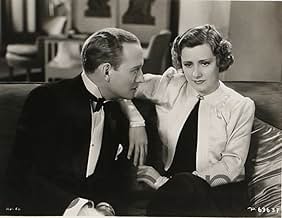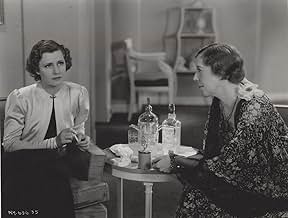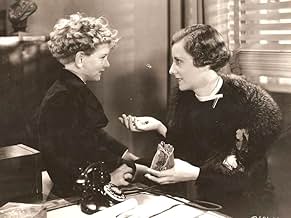A prison reformer and a controversial judge fall in love and have a child out of wedlock.A prison reformer and a controversial judge fall in love and have a child out of wedlock.A prison reformer and a controversial judge fall in love and have a child out of wedlock.
- Awards
- 2 wins total
J. Carrol Naish
- Dr. Sorelle
- (as J. Carroll Naish)
Rafaela Ottiano
- Mrs. Feldermans
- (as Rafaella Ottiano)
Wally Albright
- Mischa Feldermans
- (uncredited)
Margaret Armstrong
- Miss Jones
- (uncredited)
Irving Bacon
- Waiter
- (uncredited)
May Beatty
- Nurse
- (uncredited)
- Director
- Writers
- All cast & crew
- Production, box office & more at IMDbPro
Featured reviews
It is doubtful if, at this point in time, anyone needs to be reminded of the consistent excellence of the versatile Irene Dunne, whose presence enhanced drama, comedy and musical films for many years. ANN VICKERS recalls to us how effective her subtle talent was even early in her career, playing a character alternately strong and vulnerable in a story too crowded with incident to give its major players the room they require to draw the characters fully. As a capable and resolute professional woman involved in social work and prison reform, Dunne's title character is curiously susceptible to the less-than-worthy men she finds more appealing than the steady earthbound types she encounters but does not favor. This contradictions accounts for a large part of the interest in her character, discreetly but firmly abetted by the nuances of yet another outstanding performance. Irene Dunne is perhaps the most reliable of all leading ladies. If you share the admiration of many for her work, this somewhat obscure picture will not disappoint you.
Ann Vickers (1933)
** (out of 4)
Static version of Sinclair Lewis' play has Irene Dunne in the title role of a social worker who gets dumped by an American soldier (Bruce Cabot) and then puts all her attention on her work. She eventually falls for a controversial judge (Walter Huston) but this here might cost her everything she's worked for. This RKO film was produced by Merian C. Cooper the same year he made King Kong but that's the only thing the two films have in common. Dunne is good in her role but the film is all over the place and it's easy to see that the film is trying to cover several parts of the book but can't take everything in within the short running time. Huston stays under control and gives a winning performance as does Cabot and Conrad Nagel in his supporting role. Edna May Oliver and J. Carrol Naish also have small roles.
** (out of 4)
Static version of Sinclair Lewis' play has Irene Dunne in the title role of a social worker who gets dumped by an American soldier (Bruce Cabot) and then puts all her attention on her work. She eventually falls for a controversial judge (Walter Huston) but this here might cost her everything she's worked for. This RKO film was produced by Merian C. Cooper the same year he made King Kong but that's the only thing the two films have in common. Dunne is good in her role but the film is all over the place and it's easy to see that the film is trying to cover several parts of the book but can't take everything in within the short running time. Huston stays under control and gives a winning performance as does Cabot and Conrad Nagel in his supporting role. Edna May Oliver and J. Carrol Naish also have small roles.
It seems ridiculous to us now that this was so controversial at the time and put the censors into a wild uncontrollable rage. Perhaps that's because it doesn't quite feel like an early thirties movie. The acting, the production and certainly the story seem much more modern.
Taken out of the context of its age, it's a fairly ordinary plot. There's no doubt it is extremely well made and but at the end of the day, it's just a story about an ordinary social worker. It's not something that you can get too excited about or want to watch again. Plenty of early thirties pictures are still entertaining as stand alone movies today - this however is one of those which is only interesting as a presentation of the morality, the attitudes, prejudices and constraints of the time.
Unlike some other "social injustice movies" of the time, this doesn't use an emotional sledgehammer to get its point across. Whilst that makes this feel more modern, if you love that old sensationalist approach such as used in NIGHT COURT or SAFE IN HELL you might find this a little bland and disappointing.
Taken out of the context of its age, it's a fairly ordinary plot. There's no doubt it is extremely well made and but at the end of the day, it's just a story about an ordinary social worker. It's not something that you can get too excited about or want to watch again. Plenty of early thirties pictures are still entertaining as stand alone movies today - this however is one of those which is only interesting as a presentation of the morality, the attitudes, prejudices and constraints of the time.
Unlike some other "social injustice movies" of the time, this doesn't use an emotional sledgehammer to get its point across. Whilst that makes this feel more modern, if you love that old sensationalist approach such as used in NIGHT COURT or SAFE IN HELL you might find this a little bland and disappointing.
Only three years into her Hollywood career (after the initial misstep of "Leathernecking" (1930), Irene Dunne shines in this pre-Code drama. Her portrayal of Sinclair Lewis' "Ann Vickers" is complex, layered and multi-faceted. She is a modern woman and she is determined to change the world as Edna Mae Oliver's character states "if it takes her all winter". But the world almost breaks her. She is impregnated and then emotionally abandoned by Bruce Cabot's cad "Lafe", sent to work in a Purgatory of a women's prison, and finally saved by the love of Walter Huston's Judge Barney Dolphin. In him, she has met her equal--morally, intellectually, and emotionally. Their love is here to stay, as we see when she not only proudly bears their son out of wedlock but stands by him when he is sent to prison on political corruption and graft charges trumped up by his opposition. She too suffers in that she loses a top-tier professional post and must makes ends meet by writing freelance newspaper articles. However, she is undaunted and toughs it out until such time that Barney is paroled and reunited with her and their young son. It is so refreshing to see Dunne in this early role, so far removed from both the screwball comedy and perfect wife and mother roles she would play in the middle and latter phases of her long career. We mourn with her the loss of her first child, the death of whom is ambiguously depicted as coming about by abortion. We rejoice in her finding her soulmate, Barney and cheer them for their unaffected love and affection and the joy they express over their impending parenthood. While this is a "weepie", the Queen of which she would become, Dunne's performance is superior to that of her similar roles of this era. Her talent is just as complex and strong as that of her character and she inhabits the role exquisitely.
Lackluster romantic drama with feminist elements. Basically it's Irene Dunne spouting off about wanting to have her own career and being involved in relationships with douchebags. All of the success she has career wise is ultimately attributed to a man and the film's message seems to be that a woman's happiness only comes from the love of a man, so I really don't see where feminists are supposed to find much to love about this film. The brief middle part of the film dealing with the brutal goings-on at a women's prison are most interesting. They should've made an entire film of that. The rest is forgettable. The cast is fine. No standouts. Edna May Oliver is wasted, which is just criminal.
Did you know
- TriviaSome objections were made by the Hays Office concerning the plot of the first draft of the screenplay, where Ann marries Captain Resnick and then has an affair with Barney. The plot was changed to Ann being seduced by the Captain with the offense somehow deemed less if only one of the parties in the adulterous affair is married. No reference is made about any abortion in the trip to Havana, and in the released print the cause of death of Ann's baby girl is never mentioned. RKO applied for an "Approved" certificate in 1935, when the production code was more rigorously enforced, but they were informed that no certificate would be given because of the film's attitude towards adultery.
- GoofsAlthough the first part of the picture takes place in 1918, all of Irene Dunne's hairstyles and clothes are strictly in the 1933 mode, and continue as such through the decade of the 1920s which follows.
- Quotes
Barney Dolphin: [last lines]
Matthew Dolphin: Who are you?
Barney Dolphin: Well, son, i refuse to answer without advice of counsel.
- Crazy creditsThe opening credits are printed in the pages of the novel. They are revealed by a man's hand opening the book and turning the pages.
- ConnectionsFeatures Her Man (1930)
- SoundtracksSmiles
(1917) (uncredited)
Music by Lee S. Roberts
Lyrics by J. Will Callahan
Played by a band for dance music at the Lorlears Hook Settlement House
Whistled by Sam Hardy
Danced by Sam Hardy and Helen Cromwell and other couples
Details
- Release date
- Country of origin
- Language
- Also known as
- Sinclair Lewis' Ann Vickers
- Filming locations
- Production company
- See more company credits at IMDbPro
Box office
- Budget
- $303,000 (estimated)
- Runtime
- 1h 16m(76 min)
- Color
- Aspect ratio
- 1.37 : 1
Contribute to this page
Suggest an edit or add missing content




































